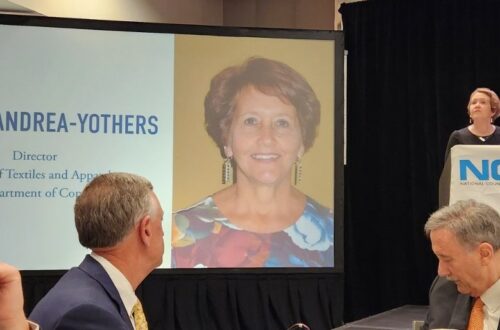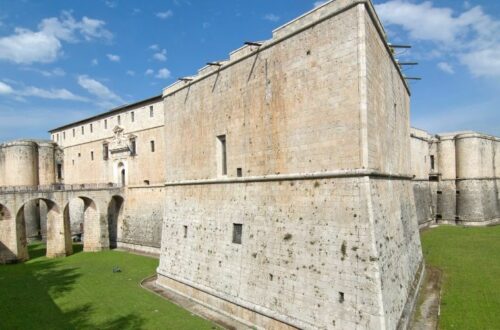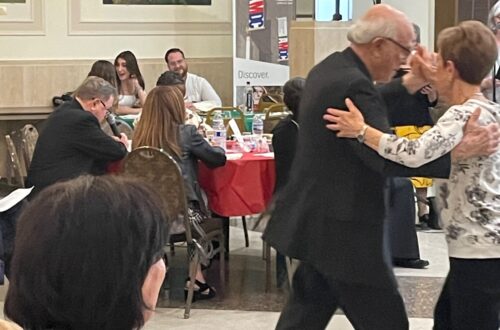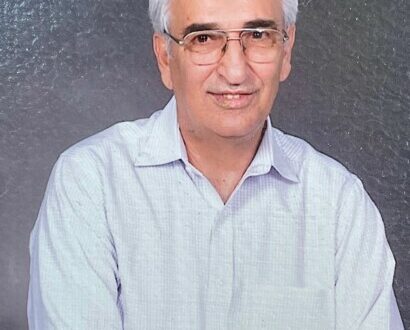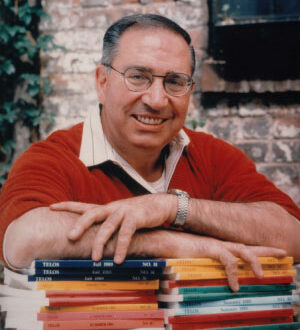-
Remembering Salvatore Di Pilla
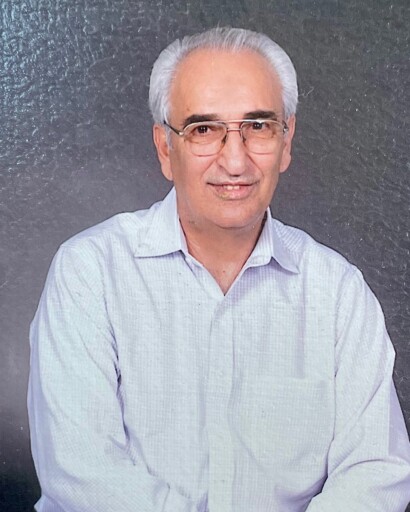
By Nancy De Santi
The AMHS lost one of its long-time, cherished members, Salvatore (Sal) DiPilla, who passed away suddenly on March 24, 2024. He suffered a heart attack while walking with his wife, Anna Maria, near their home. Sal was 82. His passing was a shock to his friends and fellow AMHS members who had just seen him two days before at Holy Rosary Church and afterwards in Casa Italiana, wishing everyone “Buona Pasqua!”
At the funeral Mass on April 6, the Holy Rosary Church was packed. Sal was loved by many people. Many parishioners, AMHS members, and Sal’s neighbors were there, as well as the priest and Anna Maria’s co-workers from the Catholic school day care center where she works.
Sal’s friends could expect to see him nearly every Sunday at the Italian Mass and afterwards having coffee in Casa Italiana. Sal and Anna Maria attended nearly all AMHS programs over the years.
Sal leaves behind his wife of 48 years, Anna Maria (Ciccone), his son Sistilio (Leo), and his grandson, Nico Salvatore. Sal’s two brothers-in-law, Vince and Mario Ciccone, were also faithful AMHS members for many years.
Sal was born in 1941 in Italy to Sistilio and Angelina. Sal served in the Alpini, the Italian Army’s elite mountain infantry, before marrying Anna Maria Ciccone in 1966 at age 25. Shortly after getting married, the newlyweds emigrated from Pacentro in Abruzzo to the Washington, D.C. area, where they joined Anna Maria’s brothers Vince, Mario, Dino, and Remo Ciccone, soon to be followed by Sal’s only sister, Rosina DiPilla Zandi.
It was in the suburbs of Washington, D.C., an unfamiliar place in an unfamiliar country, that Sal began to build a new life with his wife and two children, Leo and the late Angela. Sal was a talented, skilled, brick mason, in the Italian tradition of superb craftsmanship. Everyone who knew Sal knew that he loved spending time with his family, going to Sunday Mass, watching old James Bond movies, and watching his favorite sport – soccer.
Lucio and Edvige D’Andrea recall visiting Edvige’s home town of Pacentro years ago and visiting Sal’s family, including his mother who died last year at the age of 101.
Sal will be deeply missed, but his legacy is a life well-lived, full of love for his family. Our deepest condolences to Anna Maria and Sal’s family.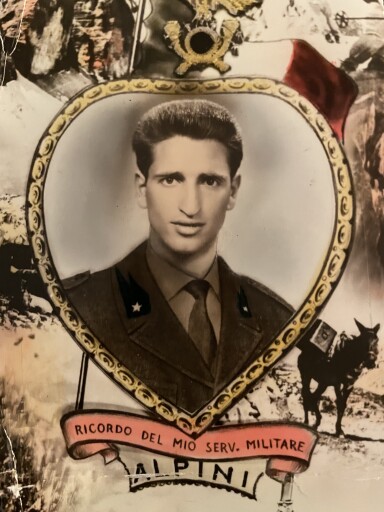
Sal as a member of the Alpini, the Italian Army’s elite mountain infantry.
Credit: Courtesy of the DiPilla family
April 2024
-
A Remarkable Life: Omero Sabatini, With Some Personal Recollections
By Nancy DeSanti
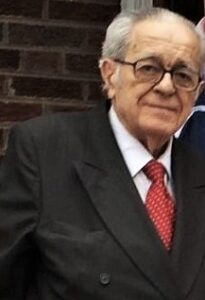
A proud member of our Italian-American community and former AMHS President, Omero Sabatini, passed away peacefully at home in Alexandria, Virginia, on March 5, 2024, at the age of 92. He was a man of deep faith, a loving family man, and a cherished friend to many. The funeral Mass for Omero was held in Holy Rosary Church at 10 a.m. on March 13, 2024. At the end of the Mass, the beautiful “Bells of St. Peter’s Basilica” rang out, just as Omero had asked.
He was born on June 26, 1931, in East Chicago, Indiana. When he was three years old, his mother took him and his brother Bruno to Italy, where he grew up in the town of Secinaro in the province of L’Aquila in Abruzzo. While in Italy, he lived through the hard times and deprivations of World War II, then eventually graduated from La Sapienza in Rome, considered the most prestigious university in Italy. While he was a student, he acquired one of his prized possessions, a photo of him and his brother Bruno with Donna Clelia, the daughter of Giuseppe Garibaldi, in 1952 on the island of Caprera.
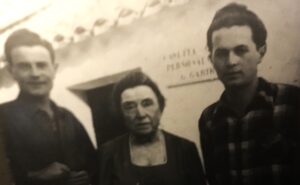
Omero Sabatini (right) and his brother Bruno in 1952 with Donna Clelia, the daughter of Giuseppe Garibaldi.
Credit: courtesy of the Sabatini familyHe returned to the United States in 1954, learned English, and earned a Master’s degree from the University of Chicago. He married and had three children: Giuseppe, Sean, and Maria. Omero served as an economist with the Economic Research Service of the U.S. Department of Agriculture and as an international economist in the Africa Division of the U.S. Department of Commerce. He decided to go into the diplomatic service and received his Foreign Service Commission in 1981 at the late age of 50. His world travels included postings with the Foreign Agricultural Service in Lisbon, Brussels, Algiers, and Washington. He traveled widely throughout Europe, Africa, and Asia. He occasionally served as an Italian language interpreter at the highest levels of government. Omero published numerous booklets and articles on international trade and the agricultural economies of foreign countries. He retired in 1994 at the age of 63.
Omero then became active in several Italian-American groups, including the Italian Cultural Society of Washington, the Italian Heritage Lodge in Fairfax, and the Abruzzo and Molise Heritage Society. He became its third president, following Lucio D’Andrea and Ennio Di Tullio.
His love of the Italian language led him to decide to write a new translation and adaptation of the literary masterpiece, I Promessi Sposi (The Spousal Promises), by Alessandro Manzoni. The title of Omero’s published book was “Promise of Fidelity.” Because of his labor of love, I had the good fortune to meet Omero. I had remembered my father talking about Manzoni’s book, which he had read as a schoolboy in Italy and which he had told me was considered the most famous Italian literary work after La Commedia Divna by Dante Alighieri. Pope Francis is said to keep a copy of Manzoni’s book on his desk. One day I was with a mutual friend from Holy Rosary Church at an Italian festival in Market Square in Alexandria, and Omero had a stand with a display of his book. We began chatting, and we realized that we both went to the Italian Mass in the Holy Rosary Church on Sundays.
I purchased a copy of Omero’s book and gave it to my father who read it three times. The two of them became friends, and Omero would invite my father to lunch in the Diplomat Club downtown. Omero even left a copy of my father’s book about Mussolini in the club library. Years later, when I was on a trip to Italy, I happened to be in Lecco in Lombardy, which is the location where part of the book takes place. Omero had given me an inscribed copy of his book, which I left in the main piazza, named after Manzoni, in Lecco.
Omero was a serious student of Italian literature, language, and culture, but he also had a lighter side. He loved to tell jokes, often involving carabinieri or priests. As Omero’s cousin, Mike DeBonis, noted during his wonderful tribute at the funeral Mass, if you did not get the punch line the first time, Omero would tell the joke to you again. And again. And again.
I recall having coffee in Casa Italiana after Mass one Sunday, and Omero said jokingly to me: “You really should thank me because I made your career here.” He was telling the truth. I had joined AMHS years before because I enjoyed the programs that were held inside Casa Italiana. When Lynn Sorbara stepped down as an AMHS board member to care for her mother, Omero, as the president, asked me to fill the rest of Lynn’s term. I told him: “My family is marchegiano, not abruzzese or molisano.” He said: “Close enough; do not worry about it!” So, I joined the board and that eventually led to ten-plus years as the vice president for programs. Also, Omero encouraged me to run to be a parish council member in 2013, although I told him that I did not know if I could win. Again, he said: “Do not worry about it!” Somehow, he got out the vote and persuaded all his friends to vote for me. Thus, I managed to win two terms.
Another side of Omero I got to know was as a loving family man. I was fortunate to be invited to his wedding to his second wife, Belinda Ekiko, in 2009. Over the years, she too became a dear friend. Belinda, a chemistry professor who is originally from Cameroon, has an amazing extended family in the area. It was a pleasure getting to know them well. To me, Omero truly enriched the lives of his family and friends when he married Belinda. As his health declined during his last years, Belinda took wonderful care of her husband. I also met Omero’s daughter, Maria, and we would get together whenever she visited from her home in California or Hawaii. I met Mike DeBonis and his wonderful family, and convinced Mike to give a talk to AMHS a few years ago on his career as a Washington journalist covering Congress and on his travels to Abruzzo with Omero. One anecdote Mike shared at the funeral Mass was how he was traveling on an autostrada in Abruzzo with Omero. When they had to stop at a toll booth, Omero argued with the toll taker for 15 minutes about the cost. From the passenger seat!
Through Omero, I met his good friend, Goffredo Palmerini, a journalist from Abruzzo. He visited Casa Italiana a few years ago and wrote a great tribute to Omero. It appeared in a newspaper and on a website in Abruzzo. I think that our members will be interested in Goffredo’s tribute to his friend Omero. So, I am providing a link to his article in Italian here.
Omero also tried to teach me some of the sayings that rhyme in Italian but do not always translate very well into English. They always sound better in Italian anyway. They remind me of the sayings that my father used. It seems that there was at least one for every occasion. For one example, Omero was talking about a friend who played briscola, but not very well. However, he somehow managed to beat the champion player in one of their card games. When I commented that he was quite good, Omero replied: “Not so fast. Una rondine non fa primavera.” (One swallow does not make Spring).
In looking through my files, I found a wonderful item which Omero wrote a while back. It is entitled “The Innate Courtesy of Our People.” I think that our members may be interested in it, so a copy is below. It is a good reminder about courtesy and civility at a time when they are in short supply. Omero did his best to share his wisdom and knowledge with others. On the day of his funeral, Mike DeBonis said that he had one final gift to give to Omero. At the funeral repast in Casa Italiana, Mike copied for everyone the booklet “America’s Italian Heritage,” which Omero had worked on during his last months of declining health. It ends: “With this, dear reader, I have told you all that I know about America’s Italian heritage. I hope that you have learned something from it. Stay well, and goodbye for now.”
Here is the text of Omero’s article on courtesy:
“The Innate Courtesy of Our People”
By Omero SabatiniA few days ago, I was talking with a woman whom I had just met and whose name I did not know. I addressed her as “lady.” Then, it occurred to me how rude that would be in our part of Italy. Over there, when talking with a woman with whom one is not on familiar terms, one never addresses her simply as “lady.” It is always “beautiful lady” or bella fe’ if using the local dialect. The same goes when talking with a man who is a stranger. It is always “good sir” or bon’o’ in the local dialect, instead of simply “sir. “ As far as I know, the endearing terms “beautiful“ and “good” are not used in circumstances like this one in any other western country. So, dear “beautiful ladies” and dear “good sirs,” let us be worthy of our heritage, and always let us be courteous to one another.
April 2024
